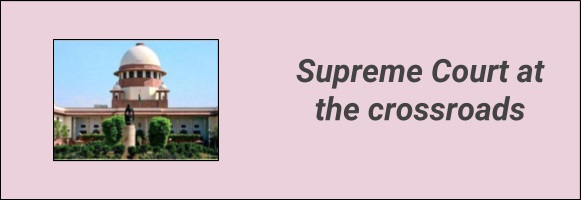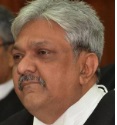(FREE) UPSC Current Affairs 2025 PDF
NEW! The Gist (AUG-2025) | E-BOOKS
Supreme Court at the crossroads : Important Topics for UPSC Exams

Supreme Court at the Crossroads : Important Topics for UPSC Exams
Why in News?
- On April 25, 2018, the government has chosen to appoint Indu Malhotra to the Supreme Court and has for the moment chosen not to appoint Justice K.M. Joseph, although his name had also been recommended along with that of Ms. Malhotra, by the collegium of five senior judges of the Supreme Court.
Analysis
- Ideally, the Supreme Court Collegium selects apex court judges from the pool of Chief Justices of High Courts.
- In January 2018, the signed resolution of Collegium recorded: “The collegium considers that at present Justice K.M. Joseph, who hails from the Kerala High Court and is currently functioning as Chief Justice of the Uttarakhand High Court, is more deserving and suitable in all respects than other Chief Justices and senior puisne Judges of High Courts for being appointed as Judges of the Supreme Court of India.
- While recommending the name of Justice K.M. Joseph, the collegium has taken into consideration combined seniority on all-India basis of Chief Justices and senior puisne Judges of High Courts, apart from their merit and integrity.”
All about Justice Joseph
 Justice Joseph’s independence and his indifference to political consequences were amply demonstrated when, as Chief Justice of Uttarakhand, he struck down a proclamation of President’s rule in the State in 2016.
Justice Joseph’s independence and his indifference to political consequences were amply demonstrated when, as Chief Justice of Uttarakhand, he struck down a proclamation of President’s rule in the State in 2016.
- The impending retirement of Justice Kurian Joseph later in November this year would have made Justice K.M. Joseph a suitable successor.
- Despite meeting all the requirements for appointment to the Supreme Court, despite the court through its collegium having recommended his name, he seems to have antagonised.
Buy Printed Complete Study Materials for UPSC IAS PRELIMS Exam
Online Crash Course for UPSC PRE Exam
Govt stand on the Issue
- Govt says that Justice Joseph is not the senior-most judge in the all-India seniority list as he is too junior in the All India List of Judges with 11 Judges ranked above him and it also pointed that the Kerala High Court already has one Supreme Court Judge and three Chief Justices of High Courts representing it.
Validity of the Govt Arguments
- Both arguments are fallacious as countrywide seniority is taken into account but is not the sole determinative factor and second, Kerala might currently have four senior judges at an all-India level, but will soon be down to two, with two retirements scheduled this year.
- Seniority is not sacrosanct in the elevation of the judges as in the 1998 presidential reference Case Supreme Court has held that “Where, therefore, there is outstanding merit the possessor thereof deserves to be appointed regardless of the fact that he may not stand high in the all India seniority list or in his own High Court and in past Supreme Court judges such as Ranjan Gogoi, Mohan M. Shantanagoudar, S. Abdul Nazeer, Naveen Sinha and Deepak Gupta having been chosen over their seniors..
- All that the government points to is a perception of regional imbalance and an overlooking of seniority and at the same time it must be pointed out that in the current Supreme Court, at least five judges (including two appointments from the bar) are from the Bombay High Court, at least three are from the Delhi High Court, thus to say that Kerala can’t have two judges on the court is to stretch a point.
What are the options available for Supreme Court?
- If the Collegium unanimously reiterates its recommendation then the Govt will have no option other than to follow the recommendation of Supreme Court as in the Third Judges case, it has been held that “if after due consideration of the reasons disclosed to the Chief Justice of India, that recommendation is reiterated by the Chief Justice of India with the unanimous agreement of the Judges of the Supreme Court consulted in the matter, with reasons for not withdrawing the recommendation, then that appointment as a matter of healthy convention ought to be made”.
- The crucial words in this paragraph are “unanimous agreement” and if even one of the five has a rethink, then govt will have a major say.
- Supreme Court should follow its motto which is, Yatho Dharmastato Jayah meaning, victory lies on the side of Dharma.
MODEL QUESTIONS
Q. Which of the following statements is not correct related to the recent Supreme Court Appointments?
A. Indu Malhotra has been appointed as the Supreme Court judge recently.
B. She is the 7th women judge in the history of Supreme Court.
C. Justice K.M. Joseph who is Chief Justice of Uttarakhand High court has also been elevated to the Supreme Court.
D. Seniority is not sacrosanct in the elevation of the judges.
Answer-C

